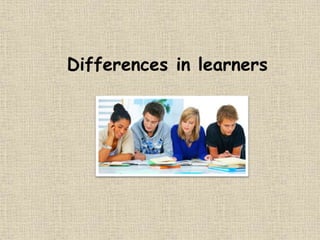
Key Differences in Learners and Learning Styles
- 2. Learning We learn from the things that happen to us - our experiences. Learning is acquiring relatively permanent change in behavior through experience. We experience things and learn to modify our behaviors based on what we know. But if we wonder why some learners are more successful than others from a linguistic perspective, we should consider this question from the perspective of the social contexts of learning. So, we address this question from a psychological perspective, focusing on differences among learners themselves. Some of the relevant research looks at neurological representation and organization, some is of an experimental nature and some relies on “good language learner” studies.
- 3. Age It is a common belief that children are more successful learners than adults, but the evidence for this is actually surprisingly equivocal. One reason for the apparent inconsistency in research findings is that some studies define relative success as initial rate of learning while other studies define it as ultimate achievement. It does not matter the age, the important key is how much the student focus the energy at learning and the method that teacher use.
- 4. Sex There do appear to be some sex differences in language acquisition and processing, but the research evidence is mixed. For example, women outperform men in some tests of verbal fluency and women’s brains may be less asymmetrically organized than men’s for speech. Of particular potential relevance to SLA are findings in relation to mental representations in the lexicon versus the grammar: females seem to be better at memorizing complex forms, while males appear to be better at computing compositional rules. Other differences may be related to hormonal variables: higher androgen level correlates with better automatized skills, and high estrogen with better semantic/interpretive skills reports that higher levels of articulatory and motor ability have been associated in women with higher levels of estrogen during the menstrual cycle.
- 5. Aptitude Aptitude is an important predictor of differential success in learning holds both for naturalistic contexts and for formal classroom instruction. It is not completely deterministic, however, and is but one of several factors which may influence ultimate L2 proficiency. •Phonemic coding ability •Inductive language learning ability •Grammatical sensitivity •Associative memory capacity
- 6. Motivation It is variously defined, but it is usually conceived as a construct which includes at least the following components: •Significant goal or need •Desire to attain the goal •Perception that learning L2 is relevant to fulfilling the goal or meeting the need •Belief in the likely success or failure of learning L2 •Value of potential outcomes/rewards
- 7. Cognitive styles Refers to individuals’ preferred way of processing: perceiving, conceptualizing, organizing, and recalling information. Unlike factors of age, aptitude, and motivation, its role in explaining why some L2 learners are more successful than others has not been well established, but extravagant claims have sometimes been made which need to be viewed with skepticism and caution. We do know that, whatever the relation of cognitive style to success, it involves a complex interaction with specific L2 social and learning contexts. Some of the traits which have been explored are: Field-dependent — Field-independent Global — Particular Holistic — Analytic Deductive — Inductive Focus on meaning — Focus on form
- 8. Personality Personality factors are sometimes added to cognitive style in characterizing more general learning style. Personality traits Anxious — Self-confident Risk-avoiding — Risk-taking Shy — Adventuresome Introverted — Extroverted Inner-directed — Other-directed Reflective — Impulsive Imaginative — Uninquisitive Creative — Uncreative Empathetic — Insensitive to others Tolerant of ambiguity — Closure-oriented Research in this area is almost always correlational: individuals are assessed for some personality trait and the strength of the relationship between that score and the result of an L2 language proficiency measure is calculated. Evidence in some cases is very limited or contradictory.
- 9. Learning strategies Differential L2 outcomes may also be affected by individuals’ learning strategies: i.e. the behaviors and techniques they adopt in their efforts to learn a second language. Selection from among possible strategies is often a conscious choice on the part of learners, but it is strongly influenced by the nature of their motivation, cognitive style, and personality, as well as by specific contexts of use and opportunities for learning. The other variables we considered earlier in this section – age, sex, and aptitude – also play a role in strategy selection. Many learning strategies are culturally based: individuals learn how to learn as part of their socialization experiences, and strategies they acquire in relation to other domains are commonly transferred to language learning, which may take place under very different circumstances, sometimes within a foreign educational system. • Metacognitive • Cognitive: • Social/affective